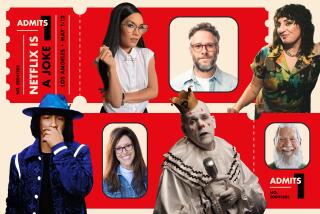L.A. Film Fest: Jonathan Demme talks Meryl Streep, ‘Ricki and the Flash’
At Sunday afternoon’s Los Angeles Film Festival tribute billed as “Jonathan Demme: American Iconoclast,” festival curator Elvis Mitchell said, “I can think of no better words” to introduce the Oscar-winning filmmaker.
Demme, 71, stepped onto the stage looking like nothing so much as a teenage skateboarder, dressed in sneakers, bandana-print sweatpants, a work jacket and a backward baseball cap. Throughout the conversation with Mitchell, which ran a little over an hour, Demme evinced the youthful enthusiasm and boundless curiosity for the world that has marked his work as a filmmaker.
The event’s description promised a special preview of Demme’s “Ricki and the Flash,” opening Aug. 7 and starring Meryl Streep as a bar band rock ‘n’ roller from a screenplay by Diablo Cody. And indeed, in the event’s last 10 minutes the film came up.
INDIE FOCUS: Sign up for Mark Olsen’s newsletter about film
A clip was shown, in which Streep is onstage with a band that includes Rick Springfield on guitar. After blazing through a rendition of Edgar Winter’s “Keep Playin’ That Rock ‘N’ Roll,” Streep’s character talks to the audience, noting that the Rolling Stones’ Mick Jagger has seven children by four women because as a rock star and a man, “Daddy can do whatever Daddy likes.” But if a female musician so much as misses one school concert, “Congratulations, you’re a monster!”
After the clip, Demme noted that Streep studied guitar for months before six weeks of band rehearsal ahead of shooting.
The bar band music in the movie was recorded live, Demme added, “We didn’t do any playback at all. Everybody was singing and playing for real, every take. We didn’t sweeten it up on the soundtrack with any overdubs in the post-production.”
The band played 10 songs for the movie, Demme said, and Streep “created the persona, she’s not doing somebody else.”
“She fashioned all the songs to her vocal interpretation, there was nobody talking to her about that, and her moves onstage are all what she wanted to do, and it thrills me to watch her play the character.”
Building up to talking about “Ricki,” Demme and Mitchell had toured through some of the lesser-known corners of Demme’s work, including clips from “What’s Motivating Hayes,” a documentary that debuted on Amazon and is based on an article from The New Yorker; his filmed adaptation of Ibsen’s “A Master Builder”; and fragments of the footage Demme shot during the Occupy Wall Street protests.
Looking for a through-line in his own work, Demme spoke of his interest in female characters and how “As a moviegoer, I love rooting for the underdog, and in our patriarchal society, if you’re going to divide it into underdogs and overlords in a male-female equation, the patriarchy is still functioning very powerfully. Women need to try that much harder, they are up against … men aren’t up against.”
He referred to the film that won him a director Oscar as well as one for picture, when he noted, “In ‘Silence of the Lambs,’ in Thomas Harris’ book he makes this stuff really manifest, in order for this one young woman to save the life of this other young woman, she has to traverse a landscape filled with every type of … man on the planet, including killers and bosses and cops. I think that’s part of what makes the movie for me so special.”
Demme told a pair of anecdotes about working with Denzel Washington on “Philadelphia” and “The Manchurian Candidate.” He also spoke of his relationship with the filmmaker Hal Ashby, who befriended Demme when he was an unknown arrival in Hollywood.
Demme also noted a valuable lesson he learned while directing Christopher Walken on the 1982 made-for-television film “Who Am I This Time?”
“Just shut up and let the actors act,” Demme said. “Create an atmosphere where they can really try everything they want to try.”
Demme laid out his driving force when he said, “I do like making positive movies. I sort of feel like at the end of the day I’d rather make pictures that have the potential for leaving somebody slightly on the upside of the experience as opposed to taking away something cynical or wrong. That’s such a fuddy-duddy perspective, but that’s just how I was raised, I guess.”
Follow me on Twitter at @IndieFocus and subscribe to my Indie Focus film newsletter.
More to Read
Only good movies
Get the Indie Focus newsletter, Mark Olsen's weekly guide to the world of cinema.
You may occasionally receive promotional content from the Los Angeles Times.











